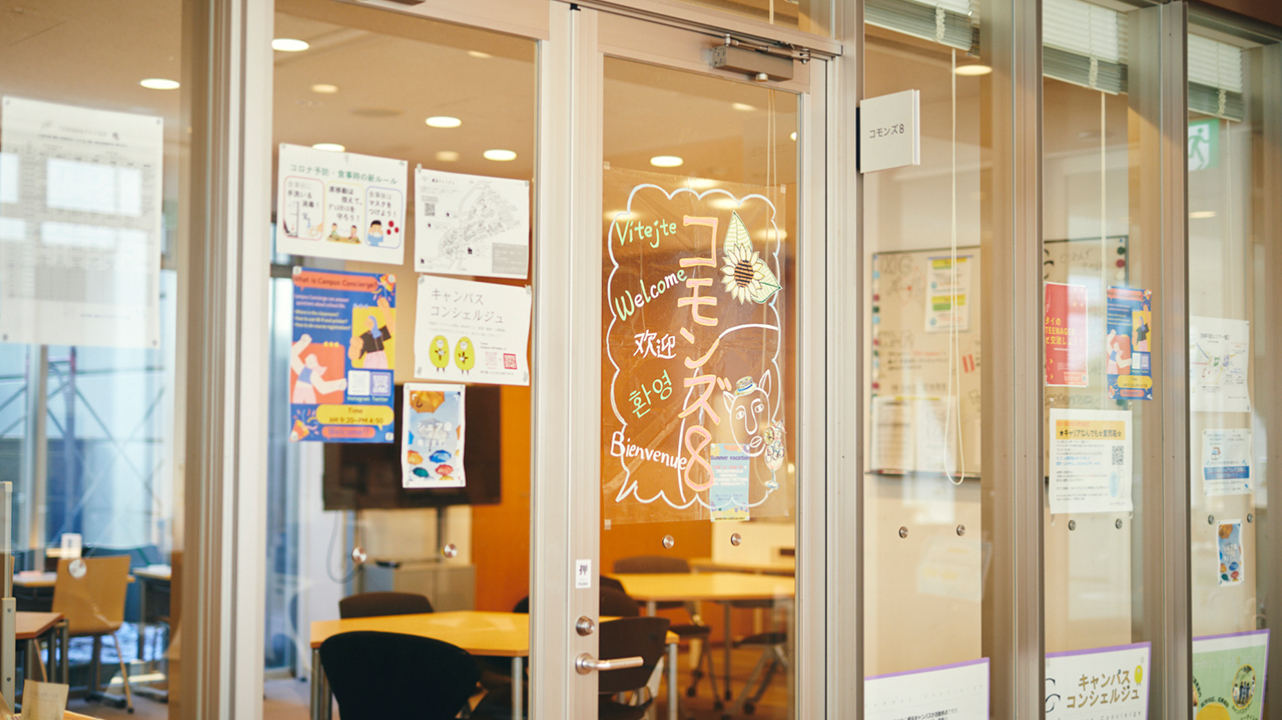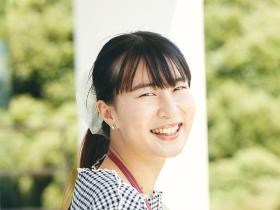Student life is more interesting when you raise your hand on your own
In her first year, Ayuka Yamashita became a student counselor to support the administration of entrance exams at Meiji Gakuin University. After that, she expanded her campus activities to serving as student staff for our Open Campus events, counseling students as a campus concierge to help improve their student life, and working with the Goat Club to help care for the goats at our Yokohama campus. She spoke to us about her reasons for remaining actively involved with Meiji Gakuin University.


Ayuka Yamashita
Fourth-year student, Department of International Studies, Faculty of International Studies
Ayuka Yamashita enrolled in the Department of International Studies to pursue her favorite areas of study, which include English, multiculturalism, and peace and conflict studies. She says the atmosphere of the students she met at an Open Campus event attracted her to our school and became a deciding factor in her decision to enroll. Her hobbies include eating Asian food and watching movies (she has watched the Detective Conan movie eight times this year). Her favorite quote is by Professor Tetsuya Sukegawa of the Department of International Studies: “To live is to experience emotions.” She spends her days off at home, playing with her smooth-coated chihuahua, Kuu.
-
Reasons for staying involved in campus initiatives
Everything I’ve been doing has been about engaging with people. Serving as a campus concierge, as an entrance exam counselor, and as Open Campus staff has given me many opportunities to speak with high school students and my fellow Meiji Gakuin students. I like talking to people, and I love being the one who introduces them to this school that I love. I guess I have a stronger desire than most people to share what’s good here. I applied to join on-campus activities after seeing announcements for them on Port Hepburn, the University’s portal site. I love being able to talk with University staff and make friends in other faculties and departments. I applied for the campus concierge position at the peak of the COVID-19 epidemic, when everyone was taking online classes. If I hadn’t been working as a concierge, I probably would have ended up only interacting with people online.

Ever since high school, I have always liked to apply for events where students can become actively engaged. In high school, I joined the yearbook committee to help put our yearbook together, and I was on the staff for our high school entrance examinations. I didn’t think I would have such opportunities in college, but my first impression was that I could participate in far more activities than I had imagined, and that they all sounded very interesting. And none of them were a disappointment!
As campus concierge leader
As a bridge between students and the University, a campus concierge provides counseling for students and plans and manages projects that improve student life (link: Peer Support at Meiji Gakuin University). Campus concierges are allocated among five “departments”: “Reps,” who manage member tasks and liaison with University staff, “PR,” which disseminates information via social media, “Admin,” which manages and orders supplies and handouts, “Stats,” which records and analyzes the results of student questionnaires, and “GA” (from “General Affairs”), which provides support for junior concierge members. Each department is given a casual name (written in hiragana in Japanese) to distinguish it from similarly named University departments.

I currently work as a leader in the Reps group, where I do things like create shifts and check proposals. When we ask our members to perform some task, we try to remain aware of how each is participating and, if they are busy with classes, what kind of support they might need so that they can take part. It is important that all members engage in our activities with a shared understanding, so as a Reps leader, I struggled to coordinate member schedules and coordinate with other departments. Particular issues were that sometimes Stats members did not know what PR members were doing, and sometimes there was a lack of understanding regarding the extent to which questions via Twitter should be handled, or where the next person should start from. I worried a lot about this situation, where our members were left unsure as to who was doing what. We worked in shifts, so some members would rarely meet or be on the same shift, so it was hard to share what everyone was doing. Now we use an application called Slack, which allows us to get a better grasp on what each department and individual member is doing. This fall semester someone else will become the Reps leader, and all fourth-year students will move to GA. Not that we’ll have our fingers in everything, but in general the younger members will be proactively leading initiatives, while we fourth-year students will provide assistance where needed.
If I were to suggest a better school life for students
In my role as a concierge, new students who are anxious about whether they will enjoy their student life sometimes come to me with questions. In such cases, I like to tell them about interesting things they can experience on campus, such as that a different food truck comes to our campus every day, or that the school sells fruit sandwiches.
Reflecting on when I was taking high school entrance exams, I didn’t get into my first choice of schools, so I had to go to another schools. I really hated that, and at first the disappointment I felt just made me feel worse and worse. But the more time I spent at that school, the more I realized it had its own interesting aspects. I met interesting teachers through the clubs I joined, and becoming involved in school events helped me make new friends.
Being convinced that your school life isn’t interesting is a self-fulfilling prophecy. I always try to keep in mind that it’s better to give something a try and find out that it’s boring than to have never tried it in the first place. There’s always a chance you’ll find that something is more interesting than you expected. So when students come to talk with me in my role as a concierge, I tell them that the environment they’re in won’t change much, so they should look for experiences that will allow them to change themselves.

Speaking plainly from the same level
As a concierge, I’m generally thankful for everyone who comes for consultations and for their coming to Commons 8, where we offer concierge services. Rather than provide formulaic answers, we try to talk with those coming for consultations at the same level, as fellow students, taking advantage of that viewpoint to provide advice that University staff might not be aware of. Of course, we try not to mislead people, instead providing them with frank advice. I think one of the strengths of a concierge is that since we are students too, there are lowered barriers between us and the students who come to us for advice. Reflecting on my own past, I remembered that in junior high school I was part of a program called School Buddies where, as an anti-bullying measure, we greeted students as they entered the school grounds and listened to them when they needed someone to talk to. I think I am still working as a concierge because I enjoy listening to what others have to say.

Meiji Gakuin recognizes your actions and thoughts
I love to talk to people, and sometimes I tend to answer without thinking much. When you dig deep into why things are the way they are, how they got that way, and what one should do about them, you come to learn new things, and I sometimes hear comments that make me aware of other ways of thinking. There have been many cases where I became painfully aware of how I didn’t apply enough thought to my consultation duties, so I’m currently trying to better myself not only by reflecting on my daily work, but also by reading and studying more.
But it feels like Meiji Gakuin provides a place for recognizing the freedom and independence of someone like me. After all, a college student need only come to campus and take some classes to have what one would call a student life, but when I think about how I want to introduce other students to the food trucks or tell high-school students about how Meiji Gakuin can be so much fun, I realize how this is a place that recognizes and fulfills such feelings.

In high school I tended to do things because my friends were doing them, and when I participated in some event, I would feel uncomfortable if I didn’t have at least one friend there. I no longer feel that way. Since coming to college, I’ve learned to do things not because it’s what my friends are doing, but because I want to.In my four years as a college student, I have come to realize that Meiji Gakuin has provided me with many opportunities to raise my hand and participate of my own volition and that this is a place where I’m free to express my thoughts and feelings. This is a place where you can be yourself, one that recognizes the things you like.

